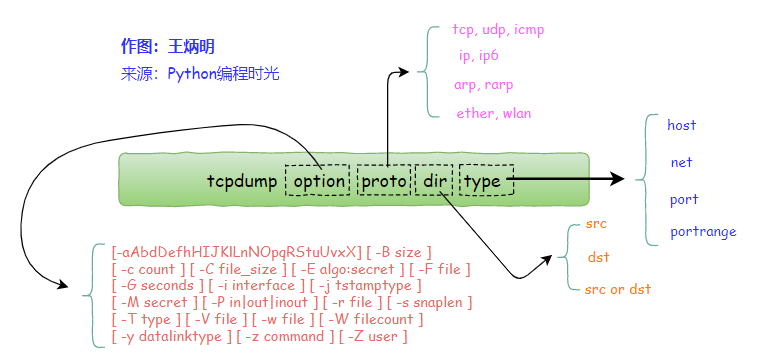libpcap简明教程
前言
因为之前简单写过wireshark入门指北,所以我知道基本的抓包流程。最近尝试调用libpcap的C API接口,顺道整理下。
本文实验如下:
- 使用tcpdump命令抓取目标地址为百度的数据包,并将结果保存文件。
- 使用tcpdump加载上面的数据包。
- 使用libpcap的API,实现上面的两个过程。
注:本文代码仅考虑在Linux环境下运行。
tcpdump的使用
如果是第一次使用tcpdump,会感觉这个命令的参数咋这么多,令人摸不着头脑。于是,每次需要写tcpdump命令,都要去问chatgpt,就像写正则一样。下面,我们将搞懂这个命令参数的结构,以后写tcpdump命令也会比较轻松。
我们去看它的官方文档,会看到tcpdump命令参数如下:
tcpdump [ -AbdDefhHIJKlLnNOpqStuUvxX# ] [ -B buffer_size ]
[ -c count ] [ --count ] [ -C file_size ]
[ -E spi@ipaddr algo:secret,... ]
[ -F file ] [ -G rotate_seconds ] [ -i interface ]
[ --immediate-mode ] [ -j tstamp_type ]
[ --lengths ] [ -m module ]
[ -M secret ] [ --number ] [ --print ]
[ --print-sampling nth ] [ -Q in|out|inout ] [ -r file ]
[ -s snaplen ] [ -T type ] [ --version ] [ -V file ]
[ -w file ] [ -W filecount ] [ -y datalinktype ]
[ -z postrotate-command ] [ -Z user ]
[ --time-stamp-precision=tstamp_precision ]
[ --micro ] [ --nano ]
[ expression ]
可以看到参数分为两部分。其中一部分是tcpdump的option。另一部分是expression。expression是一个pcap-filter。(这个expression是大名鼎鼎的BPF expression。如果不知道BPF,不影响。我之前接触过点bpf,所以概念上理解起来很轻松:bpf简介1)
这张图,可以很好的显示tcpdump命令的结构。图片来自:全网最详细的 tcpdump 使用指南。

- option:tcpdump命令的选项。
- expressio:proto、dir和type组成一个BPF完整表达式的基元。这些基元可以通过and,or,not来组合。
下面我们实际使用tcpdump命令试试。
# 抓包内容输出到标准输出。
## -nn:不把协议和端口号转化成名字; -vv:产生比-v更详细的输出; -i:指定网卡; 引号中的是BPF表达式,表抓取目标地址为百度的数据包
tcpdump -nn -vv -i enp0s3 "dst host www.baidu.com"
# -c:控制抓包个数; -w:抓包内容写入文件
tcpdump -nn -vv -i enp0s3 -c 1 -w baidu.pcap "dst host www.baidu.com"
# 读取包中的内容
tcpdump -r baidu.pcap
libpcap API的简单使用
先安装下这个库。
# ubuntu
sudo apt install libpcap-dev
然后,我们使用libpcap的API写demo,练练手。
tcpdump-libpcap中已经列出了多个教程。本节参考:
- PCAP(3PCAP) MAN PAGE:这个是官方的API文档。
- Using libpcap in C | DevDungeon:这个是一个很不错的libpcap API教程文档。内容循序渐进。美中不足的是,这篇文档是2015年写的,其中使用的一些API已经deprecate。
我这里滥竽充数的写一个libpcap的demo。这个demo展示了libpcap的使用骨架流程。结构性的了解了这些API的使用后,剩下的交给chatgpt即可。
下面是demo的流程:
- 先使用
pcap_create创建一个句柄 - 使用
pcap_set_timeout, 设置包缓冲区超时为1秒。避免等待过长时间:c - Why is there a long delay between pcap_loop() and getting a packet? - Stack Overflow。 - 句柄上其他合适的选项,也是在
pcap_create之后设置。 - 然后调用
pcap_activate激活句柄。 - 使用
pcap_compile将BPF的字符串表达式编译成伪机器码。 pcap_setfilter将生成的伪机器码制设置为句柄的过滤器。pcap_loop读取数据包,并调用回调函数。pcap_dump_*则将数据包保存到文件系统中。pcap_open_offline则是加载PCAP格式的文件。后续的过滤显示等操作,同上。
下面是完整的代码。
#include <netinet/ether.h>
#include <netinet/ip.h>
#include <pcap.h>
#include <stdlib.h>
#include <string.h>
#define DEVICE_NAME "enp0s3"
#define PACKAGE_CAPTURE_COUNT 2
#define PCAP_DUMP_FILE_PATH "./baidu.pcap"
int enum_dev() {
// 查看当前有哪些网络设备
char errbuf[PCAP_ERRBUF_SIZE];
pcap_if_t *alldevs, *dev;
// 获取可用的网络设备列表
if (pcap_findalldevs(&alldevs, errbuf) == -1) {
fprintf(stderr, "Error in pcap_findalldevs: %s\n", errbuf);
return -1;
}
int count = 1;
struct sockaddr_in in;
// 遍历设备列表并打印信息
for (dev = alldevs; dev != NULL; dev = dev->next) {
printf("Device %d: %s\n", count++, dev->name);
if (dev->description) {
printf(" Description: %s\n", dev->description);
}
for (pcap_addr_t *address = dev->addresses; address != NULL;
address = address->next) {
char addr_str[INET6_ADDRSTRLEN];
const struct sockaddr *sa = address->addr;
if (sa) {
char addr_str[INET6_ADDRSTRLEN];
if (sa->sa_family == AF_INET) {
struct sockaddr_in *ipv4 = (struct sockaddr_in *)sa;
inet_ntop(AF_INET, &(ipv4->sin_addr), addr_str, sizeof(addr_str));
printf(" IPv4 Address: %s\n", addr_str);
} else if (sa->sa_family == AF_INET6) {
struct sockaddr_in6 *ipv6 = (struct sockaddr_in6 *)sa;
inet_ntop(AF_INET6, &(ipv6->sin6_addr), addr_str, sizeof(addr_str));
printf(" IPv6 Address: %s\n", addr_str);
}
}
}
}
// 释放设备列表
pcap_freealldevs(alldevs);
printf("\n\n");
return 0;
}
int print_device_net() {
// 查看dev的 network number和子网掩码
// ipv4变量中并非ip值,而是 network number
// ref: https://github.com/the-tcpdump-group/libpcap/issues/159
char errbuf[PCAP_ERRBUF_SIZE];
int ret;
bpf_u_int32 netp;
bpf_u_int32 maskp;
char ipv4[INET_ADDRSTRLEN];
char ipv4_mask[INET_ADDRSTRLEN];
ret = pcap_lookupnet(DEVICE_NAME, &netp, &maskp, errbuf);
if (ret < 0) {
fprintf(stderr, "fail in pcap_lookupnet: %s", errbuf);
return -1;
}
inet_ntop(AF_INET, &netp, ipv4, sizeof(ipv4));
inet_ntop(AF_INET, &maskp, ipv4_mask, sizeof(ipv4_mask));
printf("%s network address is: %s\n", DEVICE_NAME, ipv4);
printf("%s mask is: %s\n", DEVICE_NAME, ipv4_mask);
printf("\n\n");
return 0;
}
void print_mac_address(const u_int8_t *mac_address, char *mac_string,
unsigned int size) {
snprintf(mac_string, size, "%02X:%02X:%02X:%02X:%02X:%02X", mac_address[0],
mac_address[1], mac_address[2], mac_address[3], mac_address[4],
mac_address[5]);
}
void print_packet_info(struct pcap_pkthdr packet_header, const u_char *packet) {
printf("Packet capture length: %d\n", packet_header.caplen);
printf("Packet total length %d\n", packet_header.len);
// todo: 从const u_char *packet中,逐层解析
char mac[ETH_HLEN + 5 + 1];
struct ether_header *eth_header = (struct ether_header *)packet;
print_mac_address(eth_header->ether_shost, mac, sizeof(mac));
printf("src mac addr is: %s\n", mac);
print_mac_address(eth_header->ether_dhost, mac, sizeof(mac));
printf("dst mac addr is: %s\n", mac);
if (ntohs(eth_header->ether_type) == ETHERTYPE_IP) {
struct iphdr *ip_header =
(struct iphdr *)(packet + sizeof(struct ether_header));
char ipv4[INET_ADDRSTRLEN];
inet_ntop(AF_INET, &ip_header->saddr, ipv4, sizeof(ipv4));
printf("src ip addr is: %s\n", ipv4);
inet_ntop(AF_INET, &ip_header->daddr, ipv4, sizeof(ipv4));
printf("dst ip addr is: %s\n", ipv4);
}
}
void capture_packet_handler(u_char *args,
const struct pcap_pkthdr *packet_header,
const u_char *packet_body) {
print_packet_info(*packet_header, packet_body);
pcap_dump(args, packet_header, packet_body);
return;
}
void capture() {
// 捕获数据包,并保存到文件
int ret;
char errbuf[PCAP_ERRBUF_SIZE];
pcap_t *pcap_handle;
struct bpf_program filter;
pcap_handle = pcap_create(DEVICE_NAME, errbuf);
if (pcap_handle == NULL) {
fprintf(stderr, "fail to execute pcap_create: %s", errbuf);
exit(-1);
}
// https://stackoverflow.com/questions/29875110/why-is-there-a-long-delay-between-pcap-loop-and-getting-a-packet
pcap_set_timeout(pcap_handle, 1000);
ret = pcap_activate(pcap_handle);
if (pcap_compile(pcap_handle, &filter, "dst host www.baidu.com", 0,
PCAP_NETMASK_UNKNOWN) < 0) {
fprintf(stderr, "fail to compile bpf rule: %s\n", pcap_geterr(pcap_handle));
exit(-1);
}
if (ret < 0) {
fprintf(stderr, "fail to active pcap hanlde: %s", pcap_geterr(pcap_handle));
exit(-1);
}
if (pcap_setfilter(pcap_handle, &filter) < 0) {
printf("Error setting filter - %s\n", pcap_geterr(pcap_handle));
exit(-1);
}
pcap_dumper_t *pacp_dump_point =
pcap_dump_open(pcap_handle, PCAP_DUMP_FILE_PATH);
if (pacp_dump_point == NULL) {
printf("fail to open dump file - %s\n", pcap_geterr(pcap_handle));
exit(-1);
}
pcap_loop(pcap_handle, PACKAGE_CAPTURE_COUNT, capture_packet_handler,
(u_char *)pacp_dump_point);
pcap_dump_flush(pacp_dump_point);
printf("\n\nsaved package to %s\n\n", PCAP_DUMP_FILE_PATH);
pcap_dump_close(pacp_dump_point);
pcap_close(pcap_handle);
}
void load_packet_handler(u_char *args, const struct pcap_pkthdr *packet_header,
const u_char *packet_body) {
print_packet_info(*packet_header, packet_body);
return;
}
void load_pcap_file() {
printf("load %s file.\n", PCAP_DUMP_FILE_PATH);
char errbuf[PCAP_ERRBUF_SIZE];
pcap_t *pcap_handle = pcap_open_offline(PCAP_DUMP_FILE_PATH, errbuf);
if (pcap_handle == NULL) {
fprintf(stderr, "fail to execute pcap_open_offline: %s", errbuf);
exit(-1);
}
pcap_activate(pcap_handle);
pcap_loop(pcap_handle, PACKAGE_CAPTURE_COUNT, load_packet_handler, NULL);
}
int main(int argc, char *argv[]) {
printf("current libpcap version: %s\n", pcap_lib_version());
capture();
load_pcap_file();
}
输出如下:
current libpcap version: libpcap version 1.9.1 (with TPACKET_V3)
Packet capture length: 98
Packet total length 98
src mac addr is: 08:00:27:84:19:39
dst mac addr is: 80:12:DF:8F:5B:F4
src ip addr is: 192.168.18.131
dst ip addr is: 110.242.68.4
Packet capture length: 98
Packet total length 98
src mac addr is: 08:00:27:84:19:39
dst mac addr is: 80:12:DF:8F:5B:F4
src ip addr is: 192.168.18.131
dst ip addr is: 110.242.68.4
saved package to ./baidu.pcap
load ./baidu.pcap file.
Packet capture length: 98
Packet total length 98
src mac addr is: 08:00:27:84:19:39
dst mac addr is: 80:12:DF:8F:5B:F4
src ip addr is: 192.168.18.131
dst ip addr is: 110.242.68.4
Packet capture length: 98
Packet total length 98
src mac addr is: 08:00:27:84:19:39
dst mac addr is: 80:12:DF:8F:5B:F4
src ip addr is: 192.168.18.131
dst ip addr is: 110.242.68.4
libpcap API的进阶使用
搞懂上面流程,然后根据实际需求编码即可。比如下面目标:
- 判断一个BPF表达式是否匹配一个在内存中的数据帧。使用
pcap_open_dead+pcap_offline_filter很容易做到。 - C语言使用libpcap输出报文到pcap文件_pcap_dump_open-CSDN博客
原文地址:https://blog.csdn.net/sinat_38816924/article/details/135707921
免责声明:本站文章内容转载自网络资源,如本站内容侵犯了原著者的合法权益,可联系本站删除。更多内容请关注自学内容网(zxcms.com)!
